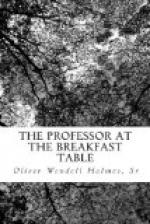The Church of the Galileans, as it is called, is even humbler in outside pretensions than the Church of Saint Polycarp. Like that, it is open to all comers. The stranger who approaches it looks down a quiet street and sees the plainest of chapels,—a kind of wooden tent, that owes whatever grace it has to its pointed windows and the high, sharp roofs—traces, both, of that upward movement of ecclesiastical architecture which soared aloft in cathedral-spires, shooting into the sky as the spike of a flowering aloe from the cluster of broad, sharp-wedged leaves below. This suggestion of medieval symbolism, aided by a minute turret in which a hand-bell might have hung and found just room enough to turn over, was all of outward show the small edifice could boast. Within there was very little that pretended to be attractive. A small organ at one side, and a plain pulpit, showed that the building was a church; but it was a church reduced to its simplest expression:
Yet when the great and wise monarch of the East sat upon his throne, in all the golden blaze of the spoils of Ophir and the freights of the navy of Tarshish, his glory was not like that of this simple chapel in its Sunday garniture. For the lilies of the field, in their season, and the fairest flowers of the year, in due succession, were clustered every Sunday morning over the preacher’s desk. Slight, thin-tissued blossoms of pink and blue and virgin white in early spring, then the full-breasted and deep-hearted roses of summer, then the velvet-robed crimson and yellow flowers of autumn, and in the winter delicate exotics that grew under skies of glass in the false summers of our crystal palaces without knowing that it was the dreadful winter of New England which was rattling the doors and frosting the panes,—in their language the whole year told its history of life and growth and beauty from that simple desk. There was always at least one good sermon,—this floral homily. There was at least one good prayer,—that brief space when all were silent, after the manner of the Friends at their devotions.
Here, too, Iris found an atmosphere of peace and love. The same gentle, thoughtful faces, the same cheerful but reverential spirit, the same quiet, the same life of active benevolence. But in all else how different from the Church of Saint Polycarp! No clerical costume, no ceremonial forms, no carefully trained choirs. A liturgy they have, to be sure, which does not scruple to borrow from the time-honored manuals of devotion, but also does not hesitate to change its expressions to its own liking.
Perhaps the good people seem a little easy with each other;—they are apt to nod familiarly, and have even been known to whisper before the minister came in. But it is a relief to get rid of that old Sunday—no,—Sabbath face, which suggests the idea that the first day of the week is commemorative of some most mournful event. The truth is, these brethren and sisters meet very




